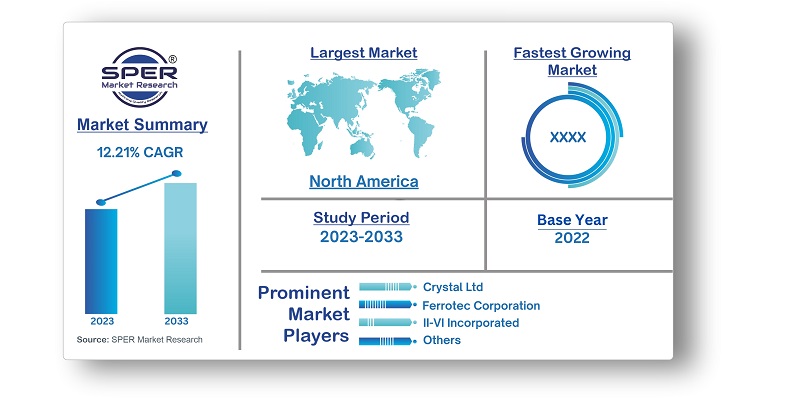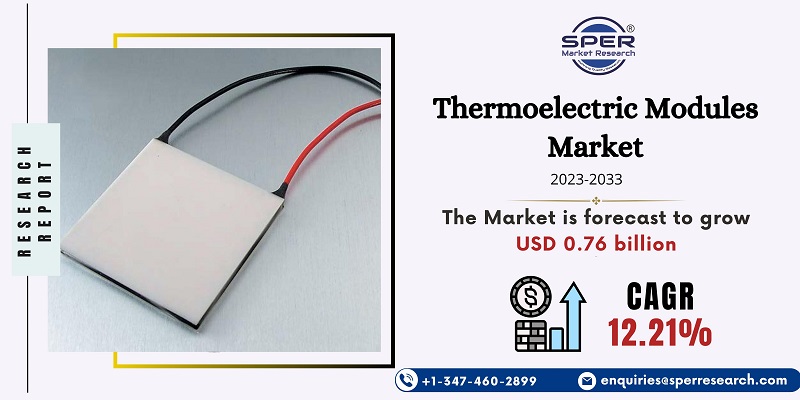
Thermoelectric Modules Market Growth, Size, Trends, Revenue, Demand, Share and Future Outlook
Thermoelectric Modules Market Size- By Model, By Type, By End User- Regional Outlook, Competitive Strategies and Segment Forecast to 2033
| Published: Jan-2024 | Report ID: SEMI2403 | Pages: 1 - 228 | Formats*: |
| Category : Semiconductor and Electronics | |||
- July 2021: The improved OptoTEC OTX/HTX Series of tiny thermoelectric coolers was introduced by Laird Thermal Systems and is intended for high-temperature settings encountered in industrial, photonics, telecom, and autonomous applications. The OptoTEC OTX/HTX Series, which uses next-generation thermoelectric materials, outperforms conventional thermoelectric coolers in terms of efficiency, temperature difference, and cooling capacity, offering a 10% increase.
- July 2020: TEC Microsystems produced the new 1MA10 Series of thermoelectric coolers, featuring aluminum plates instead of ceramics. Instead of ceramic plates, all 1MA10 thermoelectric coolers use bare metal aluminum plates. The key to TEC manufacturing is the use of aluminum rather than ceramics.


| Report Metric | Details |
| Market size available for years | 2019-2033 |
| Base year considered | 2022 |
| Forecast period | 2023-2033 |
| Segments covered | By Model, By Type, By End User. |
| Regions covered | North America, Asia-Pacific, Latin America, Middle East & Africa and Europe |
| Companies Covered | Crystal Ltd., Ferrotec Corporation, II-VI Incorporated, KELK Ltd., KRYOTHERM, Laird Technologies, RMT Ltd., TE Technology Inc., TEC Microsystems GmbH, Thermonamic Electronics (Jiangxi) Corp. Ltd. |
- Lubricant Manufacturers and Suppliers
- Oil and Gas Companies,
- Investors and Financial Analyst.
| By Model: |
|
| By Type: |
|
| By End User: |
|
- Global Thermoelectric Modules Market Size (FY’2023-FY’2033)
- Overview of Global Thermoelectric Modules Market.
- Segmentation of Global Thermoelectric Modules Market By Model (Multi Stage, Single Stage).
- Segmentation of Global Thermoelectric Modules Market By Type (Bulk, Micro, Thin Film).
- Segmentation of Global Thermoelectric Modules Market By End User (Aerospace and Defense, Automotive, Consumer Electronic, Healthcare, IT and Telecom, Manufacturing and Industrial, Oil and Gas, Others).
- Statistical Snap of Global Thermoelectric Modules Market
- Expansion Analysis of Global Thermoelectric Modules Market
- Problems and Obstacles in Global Thermoelectric Modules Market
- Competitive Landscape in the Global Thermoelectric Modules Market
- Impact of COVID-19 and Demonetization on Global Thermoelectric Modules Market
- Details on Current Investment in Global Thermoelectric Modules Market
- Competitive Analysis of Global Thermoelectric Modules Market
- Prominent Players in the Global Thermoelectric Modules Market
- SWOT Analysis of Global Thermoelectric Modules Market
- Global Thermoelectric Modules Market Future Outlook and Projections (FY’2023-FY’2033)
- Recommendations from Analyst
1.1. Scope of the report1.2. Market segment analysis
2.1. Research data source2.1.1. Secondary Data2.1.2. Primary Data2.1.3. SPER’s internal database2.1.4. Premium insight from KOL’s2.2. Market size estimation2.2.1. Top-down and Bottom-up approach2.3. Data triangulation
4.1. Driver, Restraint, Opportunity and Challenges analysis4.1.1. Drivers4.1.2. Restraints4.1.3. Opportunities4.1.4. Challenges4.2. COVID-19 Impacts on the Global Thermoelectric Modules Market
5.1. SWOT Analysis5.1.1. Strengths5.1.2. Weaknesses5.1.3. Opportunities5.1.4. Threats5.2. PESTEL Analysis5.2.1. Political Landscape5.2.2. Economic Landscape5.2.3. Social Landscape5.2.4. Technological Landscape5.2.5. Environmental Landscape5.2.6. Legal Landscape5.3. PORTER’s Five Forces5.3.1. Bargaining power of suppliers5.3.2. Bargaining power of buyers5.3.3. Threat of Substitute5.3.4. Threat of new entrant5.3.5. Competitive rivalry5.4. Heat Map Analysis
6.1. Global Thermoelectric Modules Market Manufacturing Base Distribution, Sales Area, Product Type6.2. Mergers & Acquisitions, Partnerships, Product Launch, and Collaboration in Global Thermoelectric Modules Market
7.1. Global Thermoelectric Modules Market Value Share and Forecast, By Model, 2023-20337.2. Multi Stage7.3. Single Stage
8.1. Global Thermoelectric Modules Market Value Share and Forecast, By Sales Channel, 2023-20338.2. Bulk8.3. Micro8.4. Thin Film
9.1. Global Thermoelectric Modules Market Value Share and Forecast, By Engine Type, 2023-20339.2. Aerospace and Defense9.3. Automotive9.4. Consumer Electronic9.5. Healthcare9.6. IT and Telecom9.7. Manufacturing and Industrial9.8. Oil and Gas9.9. Others
10.1. Global Thermoelectric Modules Market Size and Market Share
11.1. Global Thermoelectric Modules Market Size and Market Share by Model (2019-2026)11.2. Global Thermoelectric Modules Market Size and Market Share by Model (2027-2033)
12.1. Global Thermoelectric Modules Market Size and Market Share by Type (2019-2026)12.2. Global Thermoelectric Modules Market Size and Market Share by Type (2027-2033)
13.1. Global Thermoelectric Modules Market Size and Market Share by End User (2019-2026)13.2. Global Thermoelectric Modules Market Size and Market Share by End User (2027-2033)
14.1. Global Thermoelectric Modules Market Size and Market Share by Region (2019-2026)14.2. Global Thermoelectric Modules Market Size and Market Share by Region (2027-2033)14.3. Asia-Pacific14.3.1. Australia14.3.2. China14.3.3. India14.3.4. Japan14.3.5. South Korea14.3.6. Rest of Asia-Pacific14.4. Europe14.4.1. France14.4.2. Germany14.4.3. Italy14.4.4. Spain14.4.5. United Kingdom14.4.6. Rest of Europe14.5. Middle East and Africa14.5.1. Kingdom of Saudi Arabia14.5.2. United Arab Emirates14.5.3. Rest of Middle East & Africa14.6. North America14.6.1. Canada14.6.2. Mexico14.6.3. United States14.7. Latin America14.7.1. Argentina14.7.2. Brazil14.7.3. Rest of Latin America
15.1. Crystal Ltd.15.1.1. Company details15.1.2. Financial outlook15.1.3. Product summary15.1.4. Recent developments15.2. Ferrotec Corporation15.2.1. Company details15.2.2. Financial outlook15.2.3. Product summary15.2.4. Recent developments15.3. II-VI Incorporated15.3.1. Company details15.3.2. Financial outlook15.3.3. Product summary15.3.4. Recent developments15.4. KELK Ltd.15.4.1. Company details15.4.2. Financial outlook15.4.3. Product summary15.4.4. Recent developments15.5. KRYOTHERM15.5.1. Company details15.5.2. Financial outlook15.5.3. Product summary15.5.4. Recent developments15.6. Laird Technologies15.6.1. Company details15.6.2. Financial outlook15.6.3. Product summary15.6.4. Recent developments15.7. RMT Ltd.15.7.1. Company details15.7.2. Financial outlook15.7.3. Product summary15.7.4. Recent developments15.8. TE Technology Inc.15.8.1. Company details15.8.2. Financial outlook15.8.3. Product summary15.8.4. Recent developments15.9. TEC Microsystems GmbH15.9.1. Company details15.9.2. Financial outlook15.9.3. Product summary15.9.4. Recent developments15.10. Thermonamic Electronics (Jiangxi) Corp. Ltd.15.10.1. Company details15.10.2. Financial outlook15.10.3. Product summary15.10.4. Recent developments15.11. Others
SPER Market Research’s methodology uses great emphasis on primary research to ensure that the market intelligence insights are up to date, reliable and accurate. Primary interviews are done with players involved in each phase of a supply chain to analyze the market forecasting. The secondary research method is used to help you fully understand how the future markets and the spending patterns look likes.
The report is based on in-depth qualitative and quantitative analysis of the Product Market. The quantitative analysis involves the application of various projection and sampling techniques. The qualitative analysis involves primary interviews, surveys, and vendor briefings. The data gathered as a result of these processes are validated through experts opinion. Our research methodology entails an ideal mixture of primary and secondary initiatives.



Frequently Asked Questions About This Report
PLACE AN ORDER
Year End Discount
Sample Report
Pre-Purchase Inquiry
NEED CUSTOMIZATION?
Request CustomizationCALL OR EMAIL US
100% Secure Payment






Related Reports
Our Global Clients
Our data-driven insights have influenced the strategy of 200+ reputed companies across the globe.




















